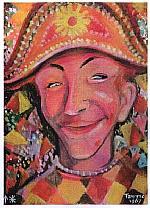The Yellow Jester
 "Mercury...appears white or pale yellow.
"Mercury...appears white or pale yellow.
In classical mythology
Mercury is the messenger of the gods and is depicted with winged sandals and
helmet.
Greek = Hermes."
- Mercury
"Buddhi (spiritual intuition) and Mercury correspond with each other and both
are yellow and radiant golden-colored."
- Esoteric Astrology
Air
"Air rules the East because this is the direction of the greatest light, and
the light of wisdom and consciousness. Its color is yellow, the yellow of the
Sun and the sky at dawn."
- Correspondences
Mercury is "the manipulator."
- Mercury
"Hermes is the messenger of Zeus and the herald of the gods...Hermes, the
robber and cattle driver, the prince of tricksters, the thief at the gates, the
bringer of dreams, the patron of travellers, is also the governor of the tongue
and the guide of intelligent speech. Hermes is called...Psychopompus for being
the guide of souls to the Underworld."
- Hermes Greek Mythology Link
As Jung (Sp. Merc. 241) says, "In comparison with the purity and unity of the
Christ symbol, Mercurius-lapis is ambiguous, dark, paradoxical, and thoroughly
pagan. ... The paradoxical nature of Mercurius reflects an important aspect of
the self - the fact, namely, that it is essentially a complexio oppositorum,
and indeed can be nothing else if it is to represent any kind of totality." He
continues (245-6): "The magic of his name enables him, in spite of his
ambiguity and duplicity, to keep outside the split, for as an ancient pagan god
he possesses a natural undividedness which is impervious to logical and moral
contradictions. This gives him invulnerability and incorruptibility, the very
qualities we so urgently need to heal the split in ourselves."
- The Pythagorean Tarot by John Opsopaus
The Yellow Jester -
Jung's Archetype of the Trickster
Trickster. Psychologically, descriptive of unconscious
shadow tendencies of an ambivalent, mercurial nature.
"[The trickster] is a forerunner of the saviour . . . . He
is both subhuman and superhuman, a bestial and
divine being, whose chief and most alarming
characteristic is his unconsciousness."
"The so-called civilized man has forgotten the
trickster. He remembers him only figuratively and
metaphorically, when, irritated by his own
ineptitude, he speaks of fate playing tricks on him
or of things being bewitched. He never suspects
that his own hidden and apparently harmless
shadow has qualities whose dangerousness
exceeds his wildest dreams."
- Jung, Collected Works.
- Jung Lexicon
"Trickster, as archetype of transitions, lives insides the joints, synapses,
sexual organs and bellies of our bodies, inhabits the
cultural middle zone between sanctioned and illicit thoughts and attitudes, and
acts as mediator of imagination between the
personal and the transpersonal. Trickster catalyzes transformation. He tricks
us into the psychological scat of our
unconsciousness, exposes the weakness of our attempts to build false edifices
of control, demands flexibility by inviting us to
play with uncertainty, and leads us by chance to the center of creation.
Trickster has been recognized in living mythology across the world and over the
ages as Hermes the thief and Prometheus the
fire stealer in ancient Greece, Coyote, Hare, and Raven in Native American
folklore, Mercurius in Alchemy, Monkey in China,
Krishna in India, Loki in Norse mythology, Legba in West Africa and the Fool in
Tarot. He is seen in tribal ritual as the sacred
clown Heyakoha, the King's jester who alone could mimic and correct the ruling
class in medieval courts, and today is viewed
on late night television as the comedian invited to utter the unutterable and
in general to make fun of the high, the mighty, and
those unfortunate to have caught the rascal's eye. Parsifal the fool who holds
the key to the kingdom's revival in the Grail
Legend, the surrealists, impressionists, and cubists who destroyed convention
in visual art, and iconoclast writers such as Allen
Ginsberg in poetry and James Joyce, author of Finnegan's Wake, are just a few
who have exerted trickster like transmutations
in the arts."
- In the Blink of An Eye
Trickster in Myth and Living
|
 "Mercury...appears white or pale yellow.
"Mercury...appears white or pale yellow.























 Arachnophilia
Arachnophilia